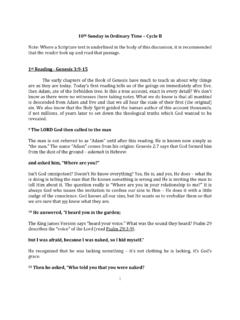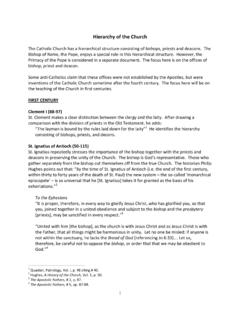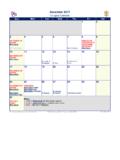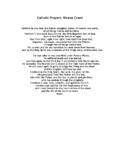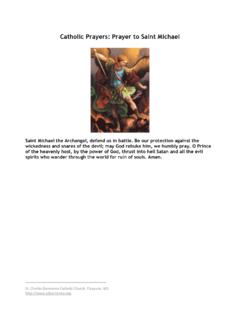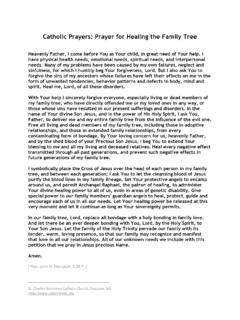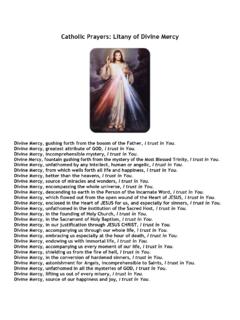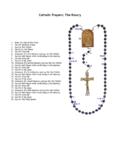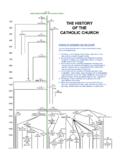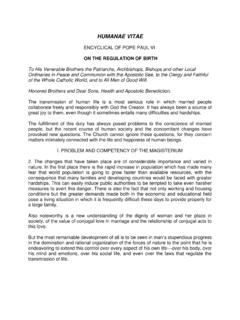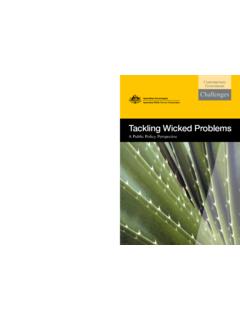Transcription of 6th Sunday in Ordinary Time - Cycle C
1 1 6th sunday in ordinary time cycle C Note: Where a Scripture text is underlined in the body of this discussion, it is recommended that the reader look up and read that passage. 1st Reading - Jeremiah 17:5-8 Jeremiah began his office of prophet 116 years after Isaiah began his, and about 620 years before the birth of Jesus the Christ. Jeremiah lived through one of the most troubled periods of the ancient Near East as he witnessed the fall of a great empire (Assyria) and the rising of one even greater (Babylon). In the midst of this turmoil, the kingdom of Judah, then in the hands of deplorable kings, came to its downfall by resisting this overwhelming force of history. The last decades of Judah s history required a continual flow of light from Yahweh s messengers; in addition to Jeremiah, the prophets Zephaniah, Habakkuk, Nahum, and Ezekiel delivered the word of God.
2 The two predominant themes of Jeremiah s message are to precisely define true Yahwehism, and to proclaim the imminent wars as punishments of Judah s aberrations. Today s reading falls into the category of true Yahwehism and is a wisdom saying on true justice. 5 Thus says the LORD: Cursed is the man The literary form used throughout this reading compares blessings and curses. We must always be mindful that there are blessings associated with fidelity to our covenant relationship with God, and curses associated with infidelity. who trusts in human beings, who seeks his strength in flesh, whose heart turns away from the LORD. The curse is to follow human beings; the blessing is to follow the Lord. 6 He is like a barren bush in the desert that enjoys no change of season, But stands in a lava waste, a salt and empty earth.
3 7 Blessed is the man who trusts in the LORD, whose hope is the LORD. 8 He is like a tree planted beside the waters that stretches out its roots to the stream: It fears not the heat when it comes, its leaves stay green; In the year of drought it shows no distress, but still bears fruit. The comparison here is with the barren bush in the desert of verse 6. The idea of the just man being like a green tree because his strength is in God is well known in wisdom literature (Psalm 52:10; Proverbs 3:18; 11:13; Sirach 24:13ff). The opposition between the 2 trust in God and trust in man is also well known in wisdom literature (Psalm 39:5; 117:8-9; 145:3ff). The intent of this saying is to put across the real heart of true religion God is man s sole refuge. The closest parallel to this reading is Psalm 1 (our responsorial psalm) where the same comparisons are used.
4 Responsorial Psalm Blessed are they who hope in the Lord. Blessed is the man who follows not the counsel of the wicked, nor walks in the way of sinners, nor sits in the company of the insolent, but delights in the law of the LORD and meditates on his law day and night. Blessed are they who hope in the Lord. He is like a tree planted near running water, that yields its fruit in due season, and whose leaves never fade. Whatever he does, prospers. Blessed are they who hope in the Lord. Not so the wicked, not so; they are like chaff which the wind drives away. For the LORD watches over the way of the just, but the way of the wicked vanishes. Blessed are they who hope in the Lord. 2nd Reading - 1 Corinthians 15:12,16-20 Today s second reading continues the teaching we heard last week on the resurrection of the dead.
5 Last week we heard the creed of the Church: Christ died for us, He was buried, He rose on the third day. Christ s resurrection is the crowning event of salvation history and man s victory over sin, Satan, and death. As Adam brought death, Christ brings resurrection from the dead. The Christian is incorporated into Christ by baptism and shares in His risen life. This final fruit of redemption in Christ will be realized for the Christian at the Lord s parousia when the dead rise in their glorified bodies. 12 But if Christ is preached as raised from the dead, how can some among you say 3 there is no resurrection of the dead? 16 For if the dead are not raised, neither has Christ been raised, Saint Paul draws a conclusion concerning a specific individual, Christ. The sense of the Corinthian claim must be that there is no such thing as resurrection from the dead; it was not part of God s plan for humanity.
6 How grave an offense it is not to believe in the resurrection of the dead. If we do not rise again, Christ died in vain and did not rise again. For if He did not rise for us, He did not rise at all, because there is no reason why He should rise for Himself. [Saint Ambrose ( 378), The Death of His Brother Satyrus 2,103] 17 and if Christ has not been raised, your faith is vain; If Christ had not risen, then their faith is based on a falsehood. The apostles would be false witnesses and their preaching valueless. you are still in your sins. The sin of Adam and the sin of the golden calf has not been forgiven and there is no possibility of having individual sins forgiven and forgotten. If Christ did not rise again, neither was He slain, and if He was not slain, our sins have not been taken away.
7 If our sins have not been taken away, we are still in them, and our entire faith is meaningless. [Saint John Chrysostom (ca. 392), Homilies on the First Epistle to the Corinthians 39,4] 18 Then those who have fallen asleep in Christ have perished. If there is no resurrection, then death is final. 19 If for this life only we have hoped in Christ, we are the most pitiable people of all. If there is no resurrection, Christians have false faith and are fools. 20 But now Christ has been raised from the dead, The faith of Christians is not based on a false premise. the firstfruits of those who have fallen asleep. What was done for Christ can be done for others, and God s goodness indicates that it will. The first fruits, like the firstborn, were offered to God and set the example of God s pleasure in all that followed. 4 Gospel - Luke 6:17, 20-26 Last week we heard Simon s call to be a follower of Jesus; with all the implications of being a follower which, in Luke s gospel is absolute renouncement.
8 Simon, James and John left everything on the seashore to follow Jesus. After recruiting Simon, James and John, Jesus continued His ministry in Galilee: healing a leper and a paralytic, enraging the Pharisees and scribes by forgiving the person s sins something only God can do. He then recruited Levi (Matthew), the tax collector, as a follower; further arousing the ire of the Pharisees and scribes by socializing with sinners. To this Jesus responded It is not the healthy who needs a doctor, but the sick. The Pharisees then questioned why Jesus disciples didn t fast and pray as did their own disciples as well as those of John the Baptist. They also observed the disciples gathering wheat to eat on the Sabbath. The Pharisees and scribes were now looking for a reason to accuse Jesus and observed Him heal a man with a withered hand; again on the Sabbath.
9 Work on the Sabbath is forbidden and certainly gathering wheat and healing are forms of work. Jesus then went out to a mountainside to pray, and spent the night praying to God. When morning came, He called His disciples to Him and chose twelve of them, whom He also designated apostles: Simon, his brother Andrew, James, John, Philip, Bartholomew, Matthew, Thomas, James son of Alphaeus, Simon the zealot, Judas son of James, and Judas Iscariot. He then came down the mountain with them and delivered the sermon on the plain which is our reading for today. The parallel gospel to this time period is Matthew 5 through 7 which is called the Sermon on the Mount. This portion of the sermon is called the beatitudes (blessings) and curses. 17 [Jesus] came down with them and stood on a stretch of level ground.
10 A great crowd of his disciples and a large number of the people Not just disciples, but many others as well. from all Judea and Jerusalem and the coastal region of Tyre and Sidon. Judea and Jerusalem are by the Dead Sea, Tyre and Sidon are on the Mediterranean seacoast north of the Sea of Galilee. Apparently, these places are mentioned to show that Jesus had followers (and curious) from far and wide. 20 And raising his eyes This is an action which denotes a solemn occasion (John 16:23; 18:13). 5 toward his disciples he said: ABlessed are you This is a form of joyful outburst or congratulation. It is different from the liturgical expression of blessing, praise or thanksgiving. who are poor, Matthew s Sermon on the Mount uses the third person the poor. The poor here are those who are the lowly ones and depend desperately upon Yahweh for help.
